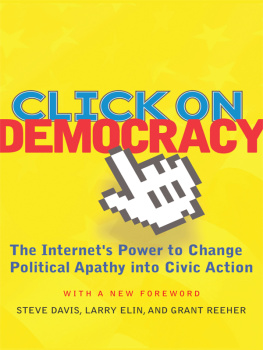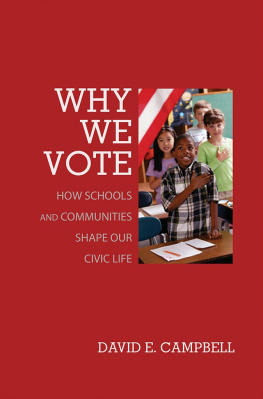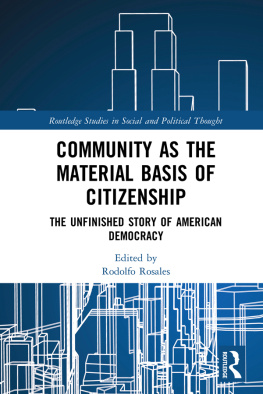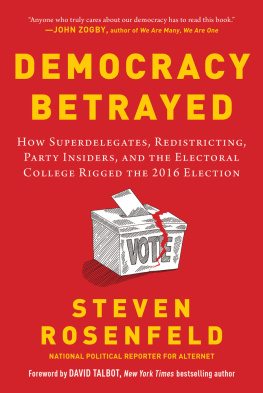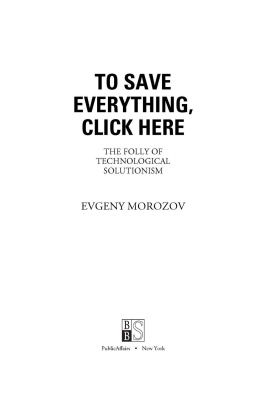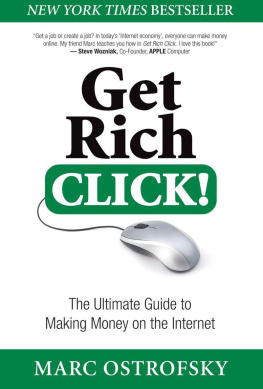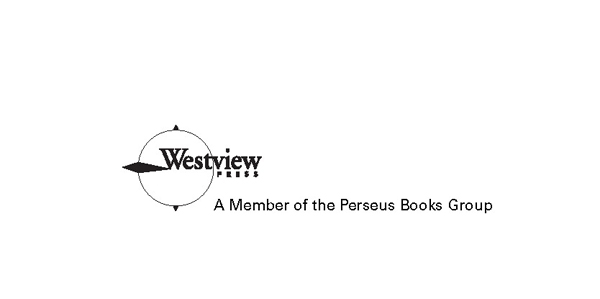CLICK ON DEMOCRACY
CLICK ON DEMOCRACY
The Internet's Power to Change Political Apathy into Civic Action
Steve Davis, Larry Elin, and Grant Reeher
All rights reserved. Printed in the United States of America. No part of this publication may be reproduced or transmitted in any form or by any means, electronic or mechanical, including photocopy, recording, or any information storage and retrieval system, without permission in writing from the publisher.
Copyright 2002 by Westview Press, A Member of the Perseus Books Group New Foreword and Preface to the Paperback Edition copyright 2004 by Westview Press
Westview Press books are available at special discounts for bulk purchases in the United States by corporations, institutions, and other organizations. For more information, please contact the Special Markets Department at the Perseus Books Group, 11 Cambridge Center, Cambridge MA 02142, or call (617) 252-5298.
Published in the United States of America by Westview Press, 5500 Central Avenue, Boulder, Colorado 803012877, and in the United Kingdom by Westview Press, 12 Hid's Copse Road, Cumnor Hill, Oxford OX2 9JJ
Find us on the World Wide Web at www.westviewpress.com
Library of Congress Cataloging-in-Publication Data
Davis, Steve.
Click on democracy : the Internet's power to change political apathy
into civic action / Steve Davis, Larry Elin, Grant Reeher.
p. cm.
Includes bibliographical references and index.
ISBN 0-8133-4183-3
eBook ISBN: 9780786745098
1. Political participationUnited StatesComputer network resources.
2. Internet in political campaignsUnited States. 3. PresidentsUnited States
Election2000Computer network resources. 4. ElectionsUnited States
Computer network resources. I. Elin, Larry. II. Reeher, Grant. III. Title.
JK1764 .D385 2002
323'.042'02854678dc21
2002008236
The paper used in this publication meets the requirements of the American National Standard for Permanence of Paper for Printed Library Materials Z39.481984.
First paperback printing, February 2004
This book is dedicated to Drew McGarr, Alan Kardoff, Mona Twocats, LuAnn Molloy, Dave Kaplan, and the other members of their online community. Though many others are not mentioned in this work, all are appreciated.
ILLUSTRATIONS
Photos
Drew McGarr
Alan Kardoff
Dave Kaplan
Mona Twocats
LuAnn Molloy
Charles Ellison
Cliff Angelo with father, Ernest Angelo Jr.
Justin Friedland
Dan Chakin
Joseph A. Morris
Jeff Cardille
Keith Joseph
Kristina Bas
The People's Campaign Web site
John Caile
Zeke Spier
R2Kphilly Web site
Kevin Matthews
Maria Mancini
David Enrich
S. B. Woo
Joe Bogosian
Rich Taylor
Mike Collins
Zack Exley
Exley's site parodied the Supreme Court, showing clown faces on the five justices who stopped Gore's recount bid
Figures
A Harvard study revealed a sharp increase in news without a public policy component.
Voter turnout has decreased steadily over the past forty years.
Internet penetration and use have grown steadily during the past ten years.
The digital divide frustrated those who thought the Internet would bring democracy to the masses.
More Republicans than Democrats were online during the 2000 election.
Online users planned to vote, apparently in greater numbers than those not online.
So few dollars were spent for political advertising on the Internet in 1998, it wasn't even reported by Media Metrix.
A tax-cut ad run by the Bush campaign included an interactive device for calculating your cut.
McCain banner ads ran in Virginia to help him get on the ballot in that state's primary.
In an ironic happenstance, a Bush banner ad appeared over a story about Al Gore in The New York Times Online.
Candidate site visitors by gender
Nader trader vote-swapping results
The Sore-Loserman logo designed by Taylor
The Spaghetti Ballot that made Mike Collins famous
Trends in university freshman values
FOREWORD TO THE PAPERBACK EDITION
Scott Heiferman, CEO and Co-Founder William Finkel, Outreach Manager Meetup, Inc.
CLICK ON DEMOCRACY FOLLOWS THE INTERNET'S ROLE IN THE 2000 election, from the early dreams that the Internet would have the same political impact that television did in 1960, to its ultimate disappointments as the campaign cycle climaxed. But the authors rightly recognize and argue that the Internet is a completely different medium, which aids political discourse in new ways. They describe a variety of examples of how this occurs, ranging across different kinds of political communities representing different points of view.
The Internet cannot be treated simply as another mass media outlet, driven by news releases and candidate statements. Instead, interactivity, engagement, and responsiveness are the elements that will define effective online campaigns. A candidate would be well encouraged to embrace the Internet for its many-to-many nature rather than to try to use the medium in the same manner as television or print. Click on Democracy effectively shows the differences between traditional media (as exemplified by mainstream news Web sites) and the new, effective forms of Internet-inspired communications. It is up to the candidates in 2004 and beyond to recognize these differences and embrace them.
Our organization, Meetup.com, is intimately involved in this new form of Internet-based political communication and activity. Meetup was launched in June 2002 as a way for people to find a group of neighbors with a shared interest. In part, our inspiration for the effort was Robert Putnam's Bowling Alone, a work that the authors of Click on Democracy also discuss at length. Bowling Alone outlines the decline of American community and the corresponding decrease in civic engagement. But Putnam is suspicious of the impact that the Internet is likely to have on rebuilding these communities, for two principal reasons: The Internet is more efficient at connecting strangers in far-flung locations who have things in common than it is at connecting neighbors who are different; and Internet communities are essentially one-dimensional forums, where all communication is written and societal cues are absent. We didn't see these aspects of Internet communities as inherent limitations; instead, we viewed them as an opportunity to create new and valuable forms of communities.
Meetup organizes local meetings for people with a common interest about anything, anywhere. We take the step of using the social interactions exhibited on the Internet and blending them with the real world. Following the model of civic organizations from earlier eras, Meetups occur on the same day of every month. We use modern technology to organize traditional face-to-face group meetings. The decentralized nature of the Internet helps people find their local niches and encourages word-of-mouth communication. Thus, a person in Detroit who is registered for the Republican Meetup can tell an online friend in Tallahassee about the Republican Meetup and that person can attend his or her own Meetup locally, as well.
Meetup was initially conceived without much explicit focus on politics. Using the Internet to spread the word about different events, we reached out to weblogs, discussion forums, and chat-rooms to let people know about how to Meetup regarding political candidates. Fueled by grassroots political interest, the phenomenon quickly mushroomed. Our own story is entirely consistent with the theme of

